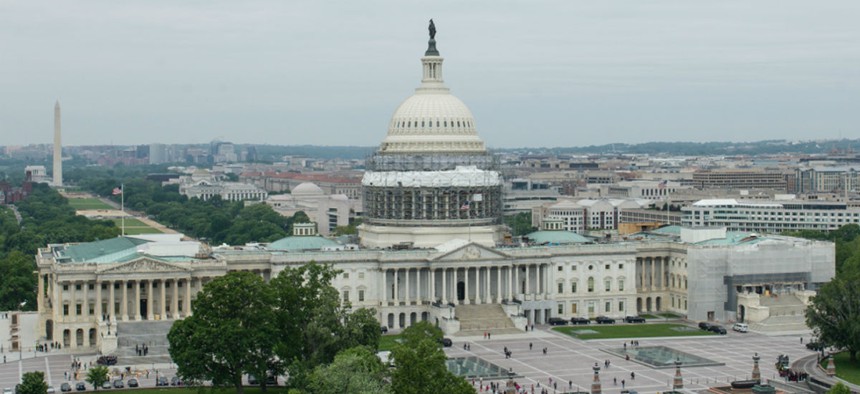
Architect of the Capitol
House Lawmakers Want You To Know They’ve Denied Themselves A Pay Raise Again
The long-standing freeze on members’ salaries is about to enter its eighth consecutive year.
House lawmakers have denied themselves a pay raise for the eighth consecutive year.
The chamber on Friday passed its 2017 legislative branch spending bill, which funds various administrative operations on Capitol Hill, including office expenses and salaries for members of Congress. A provision in the bill would maintain the freeze on lawmakers’ pay that has been in effect since 2010 (and was enacted as part of the fiscal 2009 legislative branch spending bill).
The Senate Appropriations Committee in May approved that chamber’s fiscal 2017 legislative branch spending bill, which also includes a pay freeze on lawmakers’ salaries for the next year.
Many members have touted the long-standing freeze as evidence of their focus on reining in spending. “A serious commitment to cutting spending starts with leading by example,” said House Speaker Paul Ryan, R-Wis., on Thursday when the chamber began considering the bill. Talk of increasing lawmakers’ pay has become especially politically sensitive over the past several years because of belt-tightening across government, including the three-year pay freeze on federal civilian employees, which ended in 2014, and the epic legislative battles that have tarnished the reputations of both parties in the eyes of the public, culminating in a 16-day government shutdown in October 2013.
Rank-and-file members of Congress now receive an annual salary of $174,000; the House Speaker earns $223,500 per year, while the Senate president pro tempore and the majority and minority leaders in both chambers each receive an annual salary of $193,400. The last pay boost members received took effect on Jan. 1, 2009, increasing the annual salary of rank-and-file lawmakers by $4,700 – from $169,300 in 2008 to the current level of $174,000.
Under the 1989 Ethics Reform Act, congressional members’ pay is determined through a formula based on changes in the private sector as measured by the Employment Cost Index. If lawmakers choose not to freeze their pay, then they would be in line for a maximum 1.6 percent boost in fiscal 2017, or $2,800, according to the automatic cost-of-living adjustments. President Obama has recommended a 1.6 percent pay raise for federal employees and service members in 2017, though some lawmakers are calling for a 5.3 percent bump for executive branch civilians.
Congress has frozen its pay 11 times in the past 20 years, according to data compiled by the Congressional Research Service. In 2014, when lawmakers were considering the fiscal 2015 legislative branch spending bill, then-Rep. Jim Moran, D-Va., unsuccessfully offered an amendment to that bill during the committee process that would have provided lawmakers who live 50 miles outside of Washington with a $25 housing stipend for every day Congress was in session. It would have applied to future Congresses since sitting lawmakers are prohibited from changing their own pay while in office. Moran, a 23-year House veteran who lives in Northern Virginia just 10 miles outside of Washington, retired from Congress at the end of 2014.
Moran at the time expressed concern that congressional pay freezes would become routine and part of the annual appropriations process. “I don’t think either party is going to take it upon themselves to try and change this … so I suspect five, 10, 15 years from now, it’s still going to be the same,” he said. The high cost of housing in D.C., coupled with stagnant congressional salaries, would result in a Congress made up entirely of two classes: the short-timers and the independently wealthy, the former congressman argued. Young people with families, mortgages and student loan debt, for example – individuals who can relate to the majority of Americans and their financial struggles – could be deterred from serving in Congress because they can’t afford to, Moran warned.
The total funding for the House fiscal 2017 legislative branch spending bill (excluding Senate-only items) is $3.48 billion, $73 million above the fiscal 2016 level, and $152 million below the president’s request. “The slight increase in funds is directed to essential health and safety improvements to aging or damaged facilities to protect members, staff and visitors,” said a press release from the House Appropriations Committee.
The bill also includes money for “pro-family improvements” to the Capitol, such as more convenient parking for pregnant lawmakers, a provision to add more baby-changing tables to House bathrooms for visitors, and a measure to carry on the recently-renewed tradition of sledding on Capitol Hill.







